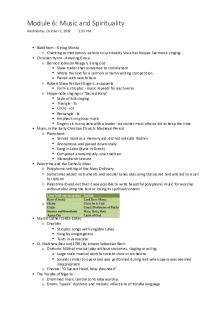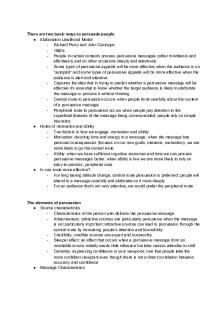Module 6 - Social Psychology Notes PDF

| Title | Module 6 - Social Psychology Notes |
|---|---|
| Course | Social Psychology |
| Institution | Collin College |
| Pages | 3 |
| File Size | 63.3 KB |
| File Type | |
| Total Downloads | 78 |
| Total Views | 148 |
Summary
Social Psychology Notes...
Description
Behavior and Belief ● This module focuses on people’s behaviors, and how they can influence our attitudes, thoughts, emotions, etc. ● Psychology states that we scientifically study behaviors and mental processes: ○ Behaviors: outward actions that are observable to others (words, facial expressions, body language, etc) ○ Mental processes: The internal events that others can’t necessarily see (thoughts, opinions, attitudes, etc) ● And we know from life experience that our behaviors and our mental processes don’t always match up!
Reciprocal Determinism ● A major concept from understanding how the environment around you, particularly other people’s behaviors can influence you is: ○ Reciprocal Determinism - Interplay between behavior, thoughts/feelings, and environment. ■ Ex: ● Environment influences behaviors (football game makes you yell); ● Behavior influences your feelings (if you yell, you’ll get angry) ● Feelings influence your behavior (more angry = more yelling) ● Behavior influences environment (more yelling makes people around you upset too)
Why does this happen? ● One reason why researchers think reciprocal determinism exists is due to: ○ Cognitive Dissonance - the feeling of tension when our thoughts don’t match up, or our thoughts don’t match our behaviors, leads us to make adjustments (either changing our thoughts or behaviors)
● Cognitive Dissonance: ○ One way tension is reduced is through Selective Exposure - we choose to only expose ourselves to information that agrees/ matches our thoughts and behaviors (similar to Confirmation Bias) ○ Another contributor to Cognitive Dissonance is Self-Perception Theory if we don’t know what our thoughts are on a given topic, we look at our own behaviors or other’s behaviors to help us decide.
Behavior → Attitude/ Thoughts ● Here are a couple specific techniques researchers have found for getting people to change their thoughts and behaviors: ● Foot-In-The-Door Technique ○ Ask for a small favor first, assuming they will say yes, THEN ask for bigger, actual favor ■ Ex: “Will you place this sign in your yard for my candidates?” Sure, not much effort on my part… ■ Then: “Could you go to the courthouse and vote for me on Tuesday, then stand outside and help count votes?” Well, I already said yes to the first task, so I guess I can do that too. ● Getting people to engage in a ‘small’ behavior typically leads to getting them to engage in bigger, more effortful behaviors!
Attitude/Thoughts → Behavior ● Door-In-The-Face Techniques ● Ask for big task first, anticipating refusal, THEN ask for smaller, actual task ○ Ex: “will you take me to the airport and pick me up next week?” No I can’t change my schedule, gas money, kids, etc. “Could you just pick me up then” Well, I feel guilty for saying no already, so I guess I can do that
Examples In Research ● Lipsitz (1989) - when blood drive callers ended the conversation with “We’ll count on seeing you then, OK?” (and waited for response), the actual show-up rate went from 62% to 81% ● Gueguen and Jacob (2001) - tripled the rate at which French participants contributed to child land-mine victims by simply asking them to first voluntarily sign a petition ● After the Korean War, POWs (Prisoners of War) were interviewed - they stated that the Koreans used a gradual escalation of commands to influence the prisoners’ thoughts and behaviors - this led to ‘Brainwashing’...
Similar Free PDFs

Social Psychology -Module-4
- 17 Pages

Social Psychology Classmate Notes
- 48 Pages

Social Psychology Notes
- 30 Pages

Social Psychology EXAM Notes
- 12 Pages

Social Psychology Ch.1 Notes
- 3 Pages

Module 6 - Lecture notes 6
- 2 Pages

Social Psychology
- 1 Pages

Social - Psychology
- 9 Pages

Module 6 - notes
- 12 Pages

Module 6 - Physics Notes
- 9 Pages

Module 6 Reading Notes
- 10 Pages
Popular Institutions
- Tinajero National High School - Annex
- Politeknik Caltex Riau
- Yokohama City University
- SGT University
- University of Al-Qadisiyah
- Divine Word College of Vigan
- Techniek College Rotterdam
- Universidade de Santiago
- Universiti Teknologi MARA Cawangan Johor Kampus Pasir Gudang
- Poltekkes Kemenkes Yogyakarta
- Baguio City National High School
- Colegio san marcos
- preparatoria uno
- Centro de Bachillerato Tecnológico Industrial y de Servicios No. 107
- Dalian Maritime University
- Quang Trung Secondary School
- Colegio Tecnológico en Informática
- Corporación Regional de Educación Superior
- Grupo CEDVA
- Dar Al Uloom University
- Centro de Estudios Preuniversitarios de la Universidad Nacional de Ingeniería
- 上智大学
- Aakash International School, Nuna Majara
- San Felipe Neri Catholic School
- Kang Chiao International School - New Taipei City
- Misamis Occidental National High School
- Institución Educativa Escuela Normal Juan Ladrilleros
- Kolehiyo ng Pantukan
- Batanes State College
- Instituto Continental
- Sekolah Menengah Kejuruan Kesehatan Kaltara (Tarakan)
- Colegio de La Inmaculada Concepcion - Cebu




